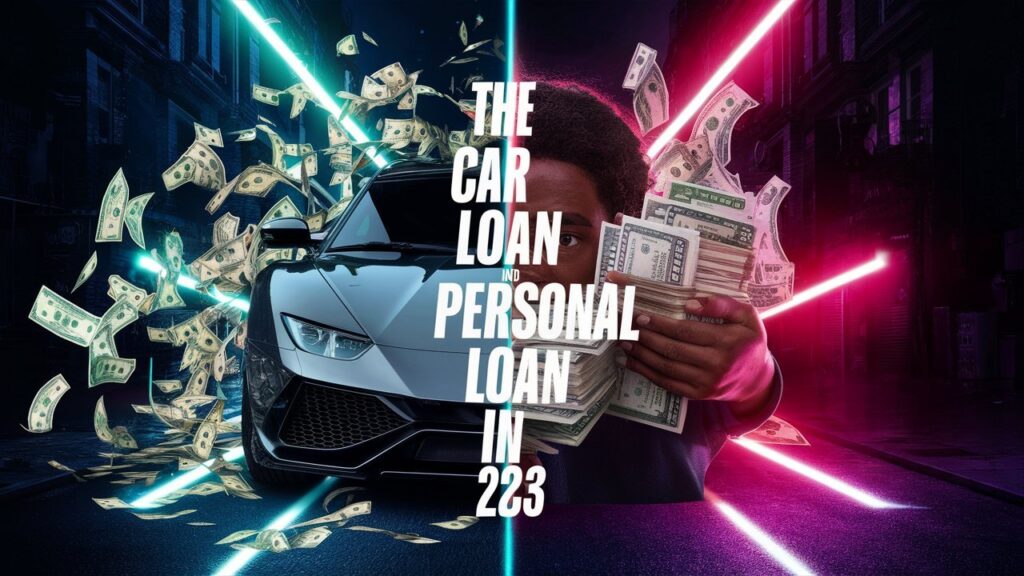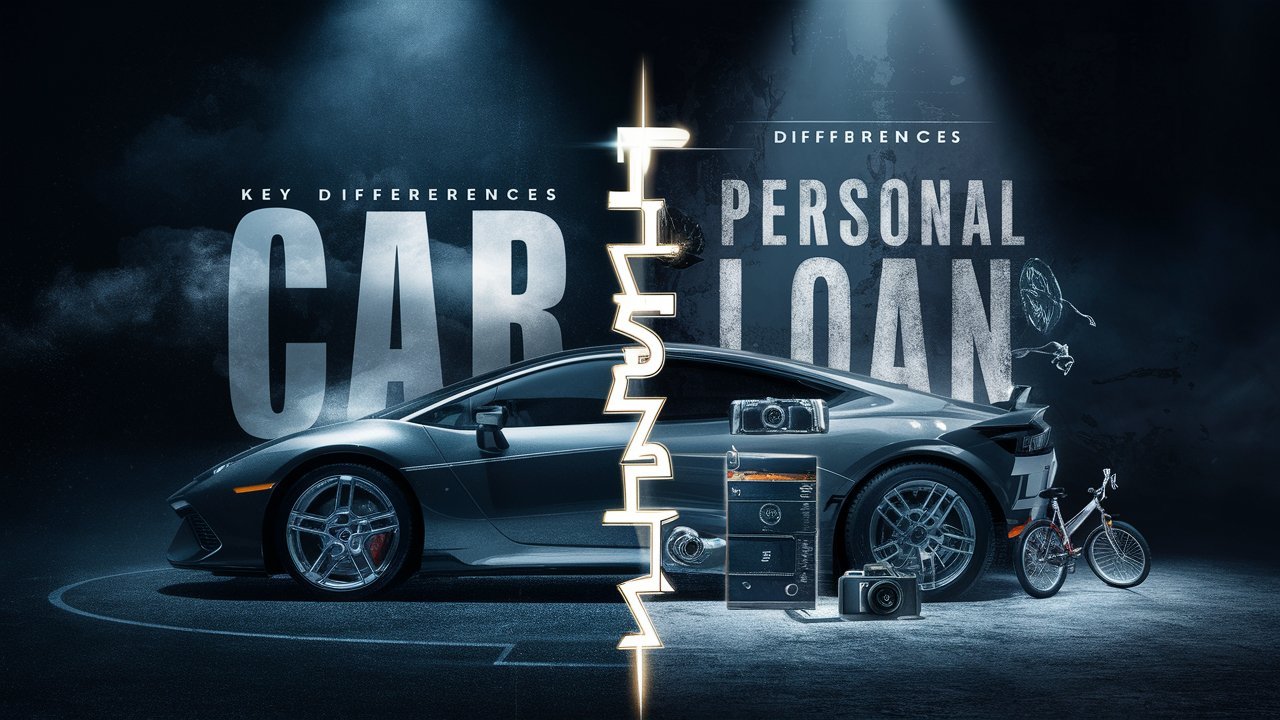Why Choosing the Right Loan Matters for Your Wallet
When buying a car, the financing decision isn’t just about securing the money🚗it’s about making sure your financial future doesn’t take a nosedive. The wrong loan could mean higher interest, sneaky fees, or rigid terms that leave you strapped for cash.

The Great Loan Showdown Car Loan vs. Personal Loan
When it comes to financing your next ride, you have two major contenders: Car Loan and Personal Loan. One is built specifically for vehicles, the other is a wildcard that can be used for anything. The question is🚗which one is the smarter move?
What is a Car Loan?
Designed for Your Dream Ride Purpose and Restrictions
A Car Loan is a financing option designed exclusively for purchasing a vehicle. This means you can’t use the funds to splurge on a vacation or pay off your credit card🚗strictly cars only! The loan is typically offered through banks, credit unions, or directly from dealerships.
The Collateral Catch Your Car as the Lender’s Safety Net
With a Car Loan, the vehicle itself acts as collateral. If you default on payments, the lender can repossess your car faster than you can say “repo man.” This collateral system makes these loans less risky for lenders, often resulting in lower interest rates compared to unsecured loans.
Fixed Destination Loan Terms, Interest Rates, and Repayment
A Car Loan usually comes with fixed terms ranging from 36 to 72 months. Interest rates are generally lower than Personal Loans due to the collateral involved, and repayment is structured into predictable monthly installments.🚗

What is a Personal Loan
No Strings Attached How Personal Loans Work
Unlike Car Loans, Personal Loans come with no specific spending restrictions. You can use them for anything🚗from buying a car to funding a wedding or consolidating debt.
Use It for Anything But at What Cost?
While the flexibility is great, the trade-off is higher interest rates. Since these loans are unsecured, lenders see them as riskier, meaning you’ll likely pay more in interest over time.
Unsecured vs. Secured Do You Need to Put Something on the Line?
A Personal Loan can be unsecured (no collateral required) or secured (where you offer assets like a savings account or property as security). Unsecured loans are more common but come with steeper rates.

Interest Rates Who Wins the Low-Cost Battle?
Car Loan Rates Typically Lower, But Why?
Because Car Loans are secured, lenders take on less risk. This results in lower interest rates, typically between 3% and 6%, depending on your credit score.🚗
Personal Loan Rates Higher Risk, Higher Cost
Since Personal Loans don’t have a built-in safety net (like a car acting as collateral), interest rates can soar from 6% to 36%, making them a pricier choice for borrowers with less-than-perfect credit.
How Your Credit Score Affects Both Loan Options
Regardless of which loan you choose, your credit score dictates your interest rate. A higher score means lower rates and better loan terms, while a lower score means you may end up with subprime rates that can burn a hole in your pocket.🚗

Repayment Terms How Long Will You Be Stuck Paying?
Car Loan Terms The Long Haul of Auto Financing
Car Loans typically range from 3 to 7 years. Longer terms mean lower monthly payments, but you’ll pay more in interest over time.
Personal Loan Terms More Flexibility, Less Structure
Most Personal Loans have repayment terms from 1 to 5 years, allowing for faster payoff but often resulting in higher monthly payments.🚗
Monthly Payments Comparing the Damage to Your Budget
A Car Loan spreads out payments over a longer period, making them more budget-friendly. In contrast, a Personal Loan can have steeper payments due to shorter terms and higher interest rates.

Approval Process Which Loan is Easier to Get?
Car Loans Dealerships and Banks Are Ready to Lend
Car dealerships, banks, and credit unions frequently offer Car Loans, making them widely accessible with competitive rates.🚗
Personal Loans Stricter Criteria or Instant Approval?
While some lenders offer quick approvals, a Personal Loan generally has stricter income and credit requirements.
The Role of Your Credit Score in Getting Approved
A good credit score unlocks better loan terms for both options, but Car Loans may still be accessible to borrowers with fair credit due to the collateral involved.
Fees and Hidden Costs What They Don’t Advertise
Car Loan Fees Dealer Markups, Origination Fees, and More
Expect dealership financing fees, loan origination charges, and potential early repayment penalties.
Personal Loan Fees Processing Charges and Early Payment Penalties
Personal Loans may include administrative fees, late payment charges, and penalties for early payoff.
Prepayment Penalties Can You Escape Without Extra Charges?
Some lenders charge a fee for paying off a loan early, reducing potential savings from early repayment.

Ownership and Vehicle Title Who Really Owns Your Car?
Car Loan Lenders Hold the Title Until You Pay in Full
With a Car Loan, the lender keeps the title until the loan is fully paid off.🚗
Personal Loan You Own It, No Strings Attached
A Personal Loan gives you full ownership of the car immediately since there’s no lien on the vehicle.
Final Verdict Which Loan is Right for You?
Key Takeaways Based on Your Needs and Budget
- Choose a Car Loan if you want lower rates and predictable terms.
- Choose a Personal Loan if you need flexibility and don’t want a lien on your car.
The Cost vs. Convenience Dilemma Explained
While Car Loans are cheaper, they come with restrictions. Personal Loans offer freedom but at a higher cost.
Smart Borrowing Tips for Getting the Best Loan Deal
- Compare interest rates before signing anything.
- Watch out for hidden fees.
- Consider your long-term financial goals before choosing a loan.
Conclusion
Making the Right Choice to Avoid Future Regrets
Choosing between a Car Loan and a Personal Loan is all about balance. The right choice depends on your financial situation, credit score, and how much flexibility you need.
How to Shop for the Best Loan Terms and Save Money
Compare lenders, negotiate terms, and read the fine print. A well-informed decision today can save you thousands in the long run.
People Also Ask
What would payments be on a $30,000 personal loan?
The monthly payment on a $30,000 personal loan depends on the interest rate and loan term. Assuming a 5-year term at a 10% APR, the estimated payment would be around $637 per month. Shorter terms increase payments but reduce interest costs.
Which loan type is better?
The better loan depends on your needs:
- Car Loan: Lower interest rates, but the lender holds the title.
- Personal Loan: More flexibility, but higher interest rates.
If you’re buying a car, a Car Loan is usually the smarter choice.
What type of loan is best for a car loan?
A secured auto loan (Car Loan) is best because it offers lower interest rates than a Personal Loan. Banks, credit unions, and dealerships provide financing, often with competitive rates.
How much is a $10,000 loan over 5 years?
A $10,000 loan with a 5-year term at 10% APR would have monthly payments of approximately $212. The final amount will depend on the lender’s specific terms and your credit score.
Is a personal loan a good idea?
A Personal Loan is a good idea if:
- You need funds for multiple expenses (medical, home improvement, etc.).
- You have a strong credit score and can secure a low-interest rate.
- You want an unsecured loan without collateral.
It’s not ideal if you’re buying a car, as Car Loans usually offer better rates.
How much is a $20,000 loan for 5 years?
For a $20,000 loan at 10% APR over 5 years, expect to pay around $424 per month. The total interest paid over the loan period will vary based on your creditworthiness.
Which bank is best for a car loan?
Some of the best banks and lenders for Car Loans include:
- Bank of America – Competitive rates for existing customers.
- Wells Fargo – Offers flexible repayment options.
- Capital One Auto Finance – Prequalification with no credit impact.
- Credit Unions (like Navy Federal, PenFed) – Often lower rates than banks.
What are 7 types of loans?
- Car Loan – Specifically for vehicle purchases.
- Personal Loan – Unsecured or secured, used for various purposes.
- Mortgage Loan – For purchasing real estate.
- Student Loan – To fund education costs.
- Business Loan – To finance small or large businesses.
- Home Equity Loan – Borrowing against home equity.
- Payday Loan – Short-term, high-interest borrowing.
Which bank is best for loans?
The best bank depends on the type of loan:
- Personal Loans: Marcus by Goldman Sachs, SoFi, Discover Bank
- Car Loans: Bank of America, Capital One, Chase Auto
- Home Loans: Wells Fargo, Rocket Mortgage, U.S. Bank
- Business Loans: SBA Loans, Chase, BlueVine, OnDeck
How many years of car loan is best?
A 3 to 5-year car loan is ideal. A shorter term means higher monthly payments but less interest paid overall. Longer terms (6-7 years) may lower payments but increase the total interest cost.
What bank is best to get a car loan?
- Bank of America – Best for low interest rates.
- Chase Auto – Great for dealership financing.
- Capital One Auto Finance – Best for prequalification.
- Navy Federal Credit Union – Best for military members.
Which bank has the best car loan rates?
Credit unions like PenFed Credit Union and Navy Federal Credit Union typically offer the lowest interest rates on car loans. Among banks, Bank of America and Capital One Auto Finance are known for competitive rates.
How much is a $100,000 loan per month?
For a $100,000 loan at 10% APR over 10 years, the monthly payment would be around $1,321. The exact amount depends on the interest rate and loan term.
Can personal loans be 10 years?
Most Personal Loans have terms between 1 to 7 years, but some lenders, such as LightStream and SoFi, offer 10-year terms for high loan amounts. However, long terms mean more interest paid over time.
How much will a $5000 loan cost per month?
A $5,000 loan over 3 years at 10% APR would have monthly payments of about $161. The actual cost depends on the interest rate and loan term.
What is the risk of a personal loan?
- Higher interest rates than secured loans.
- Potential debt trap if not managed properly.
- Fees and penalties for late or early payments.
- Credit score impact if payments are missed.
Which loan is easy to borrow?
- Car Loan – Easier if you have a stable income and good credit.
- Personal Loan – Easier for high credit score borrowers but harder for bad credit.
- Payday Loan – Easy to get but comes with extremely high-interest rates.
- Secured Loan – Easier to borrow if you have collateral (car, house, savings).
Can I use a personal loan for anything?
Yes! A Personal Loan can be used for:
- Debt consolidation
- Home renovations
- Medical expenses
- Vacations
- Buying a car (but at a higher interest rate than a Car Loan)
How much is a car payment?
The average car payment in the U.S. varies:
- New car loans: Around $725 per month.
- Used car loans: Around $516 per month.
The exact payment depends on the loan amount, term, interest rate, and down payment.







